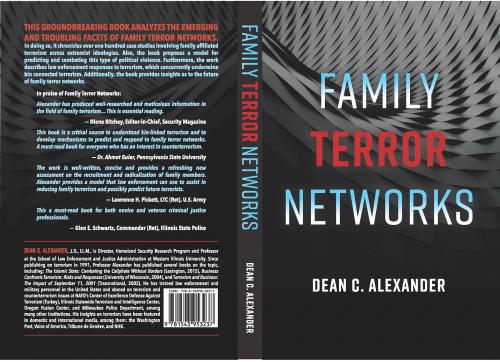University News
Extremism in the United States in 2021
December 16, 2020
MACOMB/MOLINE, IL – For more than 15 years, Western Illinois University School of Law Enforcement and Justice Administration Professor Dean C. Alexander, who leads WIU's Homeland Security Research Program, has extensively researched and studied terrorism and terrorist organizations, both on U.S. soil and abroad. In a divided nation, Alexander anticipates incidences of domestic terrorism to be on the rise in the coming months.
In a recent article for Security Magazine (December 2020) regarding extremism in the United States in 2021, Alexander writes that "extremism here encompasses multiple participants, including the radicalism of the anti-government movement."
"This highly diversified sphere of extremism comprises participants such as sovereign citizens, militias, anarchists and anti-police operatives. Naturally, these radicals often target police either directly or while their supporters carrying out other illicit activities," he explained.
According to Alexander, the October 2020 arrest of Michigan militia members planning the kidnapping of the governors of Michigan and Virginia, along with discussions to attack government targets, illustrates the seriousness of these anti-government participants.
"Traditional hate groups and bias-based movements, principally those embracing variants of white nationalism, have gained prominence during the past few years. In 2020, both the Department of Homeland Security and FBI deemed white nationalism and its followers as the main domestic extremist threat," Alexander pointed out.
Between 2017-2019, the number of white nationalist hate groups (as designated by the Southern Poverty Law Center) rose by 55 percent. The FBI's November 2020 release of hate crime statistics for 2019 notes 7,314 criminal acts (a three percent increase over the previous year) with a record 51 murders.
"Other fringe ideologies and movements, such as QAnon and incels, and their followers, and single-issue movements, such as extremist animal rights, environmentalists and anti-abortionists are another segment of concern," he added. "For example, two months ago, an Antifa supporter shot and killed a Trump supporter in Portland. The past several years have been witness to violence targeting Democrats and Republicans. Unfortunately, violent rhetoric across political constituencies and radical elements continue on an undeterred path and have been further heightened as a result of the November election and allegations of a rigged presidential election."
In addition to the foreign-aligned terrorism factions, such as al Qaida, within the United States, Alexander said homegrown violent extremists, those who ascribe to the goals of a foreign terrorist group, but act independently of it, continue to pose a dire threat to the U.S.
"Social isolation, marginalization, the pull of social media and the ease of embracing extremist ideals, aggravated by COVID-19 stressors, will likely continue in the coming years," he added. "Multiple factors are in play that incite radicalism. These extremists exploit social media to plants the seeds of discord by sharing misinformation and disinformation as truth. Individuals are swayed and mesmerized by these extremist views that seemingly offer easy solutions to unfounded, and often untrue, grievances blamed on their so-called enemies.
"Segments of radicals within the U.S., such as hate groups and militias like the Atomwaffen Division/Nationalist Socialist Order and Boogaloo Bois (Boys), are known as accelerationists in that they seek to start an upheaval precipitated by a notable attack," Alexander further explained. "Never underestimate the lethality arising from lone wolves, especially in causing mass casualty terror attacks, such as the mass shootings at the Pittsburgh synagogue in 2018 and the Orlando nightclub in 2016. The incoming presidential administration will have its hands full with these and unknown threats."
To combat such threats, Alexander notes in another forthcoming article for PoliceOne, that strong countermeasures to terrorism can be established between those activities internal to a police department and those focused on the public.
"Foremost, police management must be convinced that these threats are very real and merit concern and action. Personnel and other resources must be allocated to undermine radicalism, and management must raise awareness of the threats and the dire implications these threats have on our communities," he explained. "Acknowledging that common crimes can be associated with extremism should support law enforcement's focus on extreme radicals in their jurisdictions."
Alexander added that the public must also be aware and vigilant of the threat in their communities. Some of the well-known signs of terrorism include surveillance of, and revealing, the group's target (for example, social media posts that are drumming up support for a perceived issue by the group), acquiring supplies, fundraising, impersonation, conducting a dry run and getting into position for an attack.
"As the contributing factors to the existence of terrorism are diverse, whole society efforts (e.g., mental health, community and civic engagement, religious institutions, and schools) must be sourced to achieve success," he pointed out.
Alexander has been a member of the WIU School of LEJA since 2005. His former students work within police departments, government agencies (FBI, Homeland Security) and risk management firms across the United States. His teaching, research, and speaking activities encompass terrorism, security and legal issues, and he has lectured in 10 countries, including to law enforcement and military officials at North Atlantic Treaty Organization (NATO), U.S. State Department and National Intelligence University events. Since publishing on terrorism in 1991, Alexander has written several books on the subject, including: Family Terror Networks (2019), The Islamic State: Combating the Caliphate Without Borders (Lexington, 2015), Business Confronts Terrorism: Risks and Responses (University of Wisconsin Press, 2004), and Terrorism and Business: The Impact of September 11, 2001 (Transnational, 2002).
Posted By: University Communications (U-Communications@wiu.edu)
Office of University Communications & Marketing


Connect with us: